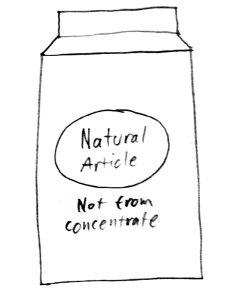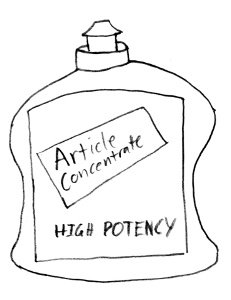Concentrate

I don't know exactly when it happened, but at some point all the supermarkets stopped selling regular dishwashing liquid and started selling dishwashing liquid concentrate. It's more efficient, you see, because you can use less of it to get the same result. The only problem is, I don't think anyone actually uses less of the concentrate than they did of the original liquid. So really you're just buying more and using more for no reason, not to mention I'm sure it costs the companies making it much less to ship the concentrate. Pretty clever marketing!
Though this issue might seem limited to my sink, it has wider-reaching consequences. The modern information era is all about concentrating things because there's no damn time to take it all in. Instead of reading a whole book (of thousands on your to-read list), you can just find a 15-minute summary. Instead of learning all the details of an emerging situation, you can get a concentrated version on a news site, and a concentrated version of that on Twitter, Facebook, or the top Reddit comment.
That's not to say these concentrates are necessarily bad things. Frankly, our brains are struggling to keep up. We're drowning in an unstoppable torrent of information and something's gotta give. Either we know about less things or we know less about them. If you can get a 15-minute understanding of an important idea, isn't that better than no idea at all? I'd say yes, with one super-important caveat: you can't consume concentrates the same way you would the original.
When you're reading a long non-fiction book, it's pretty reasonable to do so at a level of low attention. After all, the author usually takes a while to make their point, and will often make the point a few different ways to make sure you got it. There's redundancy in there that lets you be a lazy reader. Not so with a 15-minute summary of a 15-hour book. If you miss a single sentence, you're missing a whole chapter. If you don't understand some point, you're not getting a second chance. A concentrated book has to be read meticulously, more like poetry than prose.
The same issue is very common in logical languages, like those used in mathematics or programming. In their own way, they are concentrates. Each keyword in a computer program or symbol in a mathematical proof contains very densely packed information. In fact, one of the hallmarks of both fields is that if the information is not packed densely enough, usually someone will come along and invent newer, denser terms for everyone to use. Reading these languages is a unique skill; it requires learning not just the rules of the language, but the discipline to slowly unpack the meaning in each statement.
The most intense concentrates of all are found in science. Scientists might spend years designing a study, getting approval, finding funding, running experiments, analysing results, and carefully documenting their conclusions. All of that can end up distilled down to a single money quote like "differences between the observed and expected deaths are statistically significant (X² = 8.5, n = 3, P = 0.04)" – that example from the famous British Doctors Study on mortality and smoking. That's basically the whole paper right there. "Statistically significant" and some numbers is all you really need to know.
But how does that experience feel? Does looking at a number saying that smoking kills, or a single-sentence answer to a question like "Do vaccines cause autism?" convince you the same way as a heartfelt anecdote from a family member or TV celebrity? Can the distilled essence of thousands of hours of research outweigh a made-up opinion, even if the former gets 3 words and the latter gets 3000? Can we learn to read in those few words all the significance that was left off the page?
If we hope to use concentrated truth to inform us, we're going to have to.
- Dishwashing liquid now comes as a concentrate, but people still use just as much as if it wasn't concentrated.
- This concept of a concentrate is relevant generally. For example, book summaries and social news are concentrates.
- Concentrates can be a good way to deal with information overload, but you have to use them differently.
- If you read a book summary as casually as a book, you'll miss a lot of information.
- Mathematics and programming are similar; you have to unpack meaning slowly and carefully.
- Science is a special example, because so much knowledge is compressed into simple answers or numbers.
- It's very important that we take science seriously even when it gives short answers. Can we do that?
- If we hope to use concentrated truth to inform us, we're going to have to.
